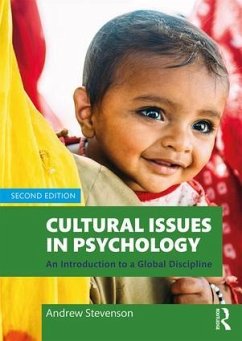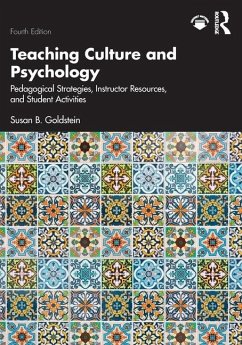
An Introduction to Culture and Psychology
A Sociocultural Perspective
Versandkostenfrei!
Versandfertig in 6-10 Tagen
53,99 €
inkl. MwSt.
Weitere Ausgaben:

PAYBACK Punkte
27 °P sammeln!
The book offers an innovative introduction to culture and psychology, taking a sociocultural perspective to understand the complexities of culture-mind-behaviour interactions.In this book, the author emphasizes the dynamic relationship of the culture and the mind, outlining how organized sociocultural models regulate actions and practices across different domains of people's lives, such as parenting, education, communication, and acculturation. Each chapter features chapter synopsis, boxed examples, a glossary of key terms, reflective questions, and recommended reading to help students engage ...
The book offers an innovative introduction to culture and psychology, taking a sociocultural perspective to understand the complexities of culture-mind-behaviour interactions.
In this book, the author emphasizes the dynamic relationship of the culture and the mind, outlining how organized sociocultural models regulate actions and practices across different domains of people's lives, such as parenting, education, communication, and acculturation. Each chapter features chapter synopsis, boxed examples, a glossary of key terms, reflective questions, and recommended reading to help students engage further with the material. The book includes a range of cross-cultural case study examples and discussions which offer insights into the connections between culture, human psyche, and behaviour.
An Introduction to Culture and Psychology is essential reading for undergraduate students taking culture and psychology courses. It can also be of interest to students and young scholars of psychology, anthropology, sociology, communication, and other related disciplines.
In this book, the author emphasizes the dynamic relationship of the culture and the mind, outlining how organized sociocultural models regulate actions and practices across different domains of people's lives, such as parenting, education, communication, and acculturation. Each chapter features chapter synopsis, boxed examples, a glossary of key terms, reflective questions, and recommended reading to help students engage further with the material. The book includes a range of cross-cultural case study examples and discussions which offer insights into the connections between culture, human psyche, and behaviour.
An Introduction to Culture and Psychology is essential reading for undergraduate students taking culture and psychology courses. It can also be of interest to students and young scholars of psychology, anthropology, sociology, communication, and other related disciplines.














